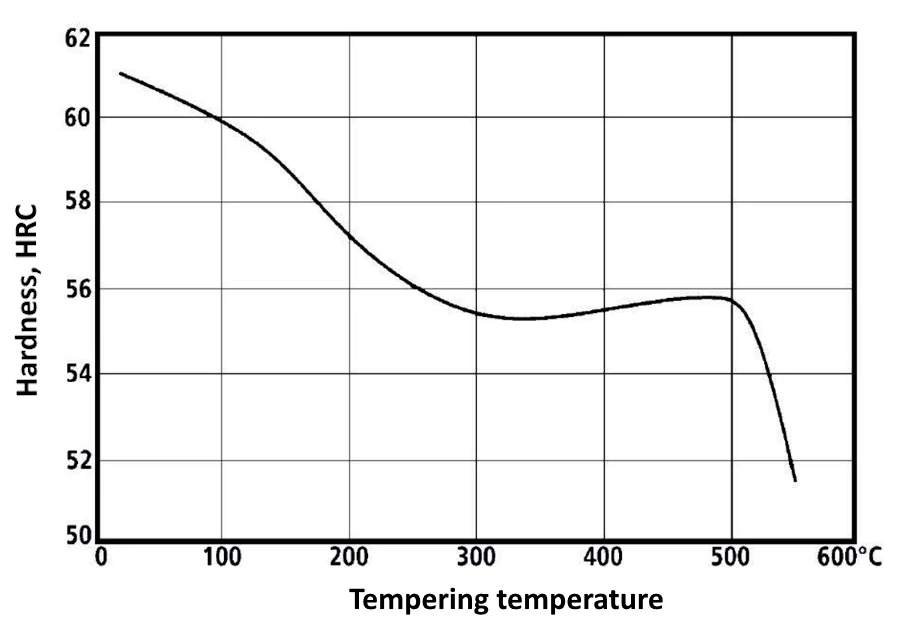N695 is a stainless martensitic chromium steel with a high carbon content and the addition of molybdenum. It has high hardness, wear resistance and good corrosion resistance. It has a balanced chemical composition, which ensures its maximum performance characteristics. Manufactured by Böhler-Uddeholm AG. An analogue is the AISI 440C brand (EN 1.4125 | DIN X105CrMo17).
In the production of Böhler N695 steel, the electroslag remelting (ESR) method is used - a method for improving the quality of steel. The presence of foreign undesirable impurities often leads to irreparable defects at the stage of mechanical processing, therefore ESR is used. Electroslag remelting is a process in which the molten metal passes through a layer of a special flux or "slag" (slag) before solidification, which selects foreign elements such as phosphorus, sulfur, etc. from the melt.
Properties
Typically supplied in annealed condition with a maximum hardness of 285 HB.
- Strength and ductility: good;
- Wear resistance: very high;
- Machinability: good;
- Dimensional stability: good;
- Polishability: good;
- Corrosion resistance: good.
Application
Stainless steel with high chromium content, high hardness, wear resistance and good corrosion resistance in quenched and tempered condition - BÖHLER N695 is typically used for parts requiring a hardness of up to 58 HRC and resistance to wear, corrosion and oxidation, such as balls, rollers, needles and rings for corrosion-resistant bearings, but the use is not limited to the following applications:
- Aerospace;
- Injection molding;
- Pharmaceutical industry, such as tablet dies and stamps;
- Extrusion screws for plastic processing;
- Food industry, such as extrusion screws, can closing rollers;
- Hot runners;
- Standard parts (molds, plates, pins, punches);
- Electronics;
- Oil and gas;
- Structural parts;
- Hydropower;
- Bearings;
- Custom hand knife manufacturing;
- General machine components;
- Packaging;
- Tubulars, flanges, fittings;
- Well logging tools;
- Chemical plant components;
- Drilling tools and components;
- Precision blanking, stamping;
- Injection components;
- Other aerospace components;
- Machine shears / knives;
- Turbine and engine parts.
Chemical composition
Chemical composition of steel grade N695 | |||||||||
| C | Cr | Mo | Mn | Si | Ni | P | Cu | S | Fe |
| 0,95 - 1,20 | 16,0 - 18,0 | 0,40 - 0,65 | 1,00 | 1,00 | 0,75 | 0,05 | 0,50 | 0,03 | Other |
Heat treatment
Heat treatment of steel N695 | ||
| Stress relieving | ||
| Temperature | max. 650 °C | Soft annealed material: for stress relief annealing after mechanical processing, hold the material at temperature in a neutral atmosphere for 1-2 hours after complete heating, then slowly cool the furnace at 20 °C [68 °F]/hour to 200 °C [392 °F], then cool in air. |
| Temperature | Hardened and tempered material: the temperature for stress relief annealing should be approx. 50 °C [122 °F] below the previously selected tempering temperature. Other procedure as for stress relief annealing of soft annealed material. | |
| Hardening and Tempering | ||
| Temperature | 1,000 to 1,050 °C | For hardening, hold the material at the specified temperature for 15-30 minutes after complete heating and quench quickly. Cool the material to approx. 30 °C [86 °F]. Tempering should take place immediately. |
| Temperature | 100 to 200 °C | Tempering treatment to the desired working hardness after hardening - see tempering diagram. Heat the material slowly and temper once for 1 hour/20 mm material thickness, but at least 2 hours. |
Tempering diagram of steel N695

- Hardening temperature: 1030 °C / 1886 °F.
- Specimen size: square 20 mm.
- Hardness up to 58 - 60 HRC.
Physical properties (20 °C)
- Density (kg/dm³): 7.7
- Thermal conductivity (W/(m.K)): 15.0
- Specific heat (kJ/kg K): 0.43
- Spec. electrical resistance (Ohm.mm²/m): 0.8
- Modulus of elasticity (10³N/mm²): 215
Thermal expansions between 20 °C | 68 °F and ...
| Temperature (°C) | 100 | 200 | 300 | 400 | 500 |
| Thermal expansion (10⁻⁶ m/(m.K)) | 10.4 | 10.8 | 11.2 | 11.6 | 11.9 |
Steel N695 is a modification of steel N690 from Böhler-Uddeholm. Compared to N690, it has higher strength at the expense of worse wear resistance. In terms of corrosion resistance, both materials are very similar and achieve the best results. Ideal for both kitchen and outdoor knives, requiring no special care other than sharpening. Can be hardened to a hardness of 59-62 HRC.
